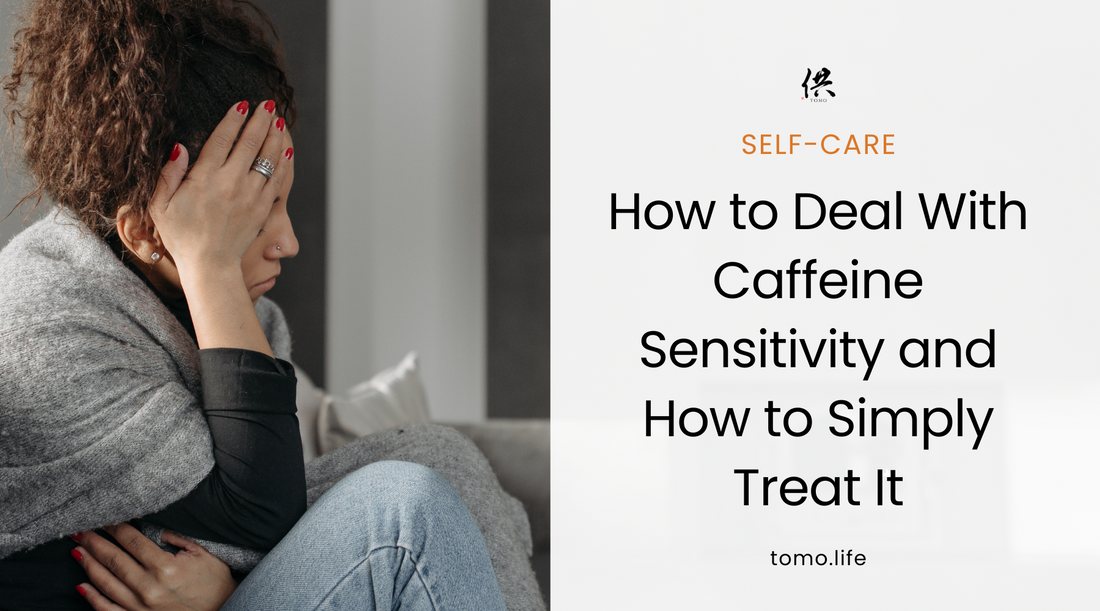
Many of us rely on caffeine for energy throughout the day: you wake up with a cup of coffee, then another one, then you consume your can of energy drink, and you might finish your day with tea.
A consumption of 400 mg of caffeine per day (or 4 cups of coffee) should be your limit. However, we all have different bodies and if some people can take a nap after 3 cups of coffee, some others might experience headaches or nausea after their first cup.
Read our article: Do you know how much caffeine you drink on a daily basis?
What is caffeine sensitivity?
First, caffeine sensitivity should not be confused with caffeine allergy, which is rare and can cause hives or even swollen tongue.
Caffeine does not give you energy, but it increases adrenaline in our bodies and people with caffeine sensitivity react badly to this phenomenon. The following symptoms might be a sign of caffeine sensitivity:
headaches
anxiety and depression
restlessness
stomachaches
heart palpitations
diarrhea
mood swing and/or irritability
Caffeine sensitivity is different for everyone, and can change according to different factors.
Read our article: How to balance your overconsumption of caffeine with this Japanese trick

Why are you caffeine sensitive?
Caffeine tolerance is determined by various factors. Here a non-exhaustive list of elements that can impact your sensitivity:
Your metabolism
Birth control
Your genes
Your age
Your sex
Medication
Pregnancy
Also, if you have been on a caffeine break, you might also experience caffeine sensitivity.
Hopefully, there are solutions to avoid suffering from caffeine sensitivity.
How to treat caffeine sensitivity?
To avoid any disadvantage related with your caffeine tolerance, you need to to adjustment in your daily routine:
Get quality sleep to avoid the need the caffeine (try naps if you can)
Get more Vitamin D
Prioritize your mental health
Exercise: try to walk at least 30 minutes a day. Regular exercise will help you improve your sleep quality
Stay hydrated and drink plenty of water
Reduce your caffeine consumption
Avoid certain medication
Avoid some vitamin supplements
Avoid coffee and decaffeinated coffee. Decaf coffee still contains caffeine, which can still give you symptoms mentioned above
Avoid caffeinated food and drinks, such as tea, energy drinks, chocolate, etc.

A healthy lifestyle and a balance of your caffeine intake will help you feel naturally energized and avoid the use of caffeine.
Sleep, healthy eating habits, and sports are often recommended for several issues. It might sound redundant and people tend to ignore these 3 elements. But surprisingly in our current society, it is not that easy to incorporate these pillars in our daily routine. Job schedules, family, and other unplanned life tasks make time management difficult and prevent us from practicing healthy habits. Scheduling your meal prep time, exercise hours and sleeping time will help you not only be more organized but also live healthier, with less stress and less need of caffeine.
Read our article: 5 Simple Secrets of People Who Are Always in a Good Mood
What can you drink with caffeine sensitivity instead of coffee?
Despite what you might think, there are several drinks you can enjoy even with caffeine sensitivity.
1. Water
To stay hydrated and avoid unnecessary cravings, water is one of the best options. If you have difficulties drinking plain water, you can prepare a bottle of aromatized water with cucumber, fruits or lemon. Starting your day with lemon water is said to boost your metabolism and aids digestion.
2. Caffeine-free drinks
There are a lot of naturally caffeine-free drinks around you: apple juice, orange juice, peppermint tea (yes!)...
If you don’t have time to make your own juice or to infuse your drink, you should research if the drinks you are consuming are caffeine-free. This information is generally available on labels or on the brands website.
3. Coffee alternative
Coffee alternative is the best option if you have coffee cravings. Most of them are cereal based such as barley tea or chicory coffee, but there are also organic and rice based options such as roasted brown rice coffee.
The best coffee alternative for caffeine sensitivity: TOMO Genshin Roasted Brown Rice Coffee
Japanese roasted brown rice coffee or “Genshin” is a traditional drink that has been used as a folk remedy for centuries. It is called “brown rice offee” due to its appearance similar to coffee.

On the nutritional side, brown rice is known to be rich in vitamins and minerals. It even contains up to 10 times more vitamin B1 than white rice.
Naturally caffeine-free, Genshin does not disturb your sleep and it has no diuretic effect. This Japanese drink helps to warm your body in order to boost your immune system.
Buy Genshin Roasted Brown Rice Coffee on Amazon
Buy Genshin Roasted Brown Rice Coffee on TOMO Japanese Online Shop
Conclusion
Caffeine sensitivity is different for everyone, and can change according to different factors. Headaches, heart palpitations and insomnia are among the most common symptoms. To treat caffeine sensitivity, you decrease your caffeine intake with caffeine-free coffee alternatives like Genshin coffee and be careful about your daily routine and habits.

